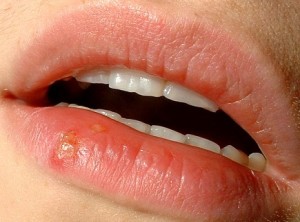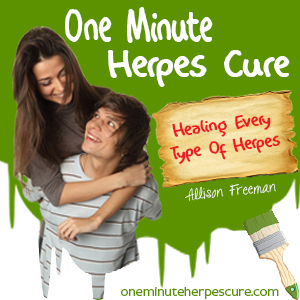Cold Sores – STDzip.com – Something’s off … It’s been a couple of days since you’ve first started to feel this strange tingling sensation and slight numbness on your lower lip. You didn’t think much of it and decided to go about your business. But now it’s getting worse. You started to notice this small watery bump on your lip and it ain’t pretty.
“This has got to be zits.” You thought to yourself. A valid but inaccurate assumption. While the bump does indeed resemble an acne due to its reddish color and tenderness, acne’s however do not blister nor open up. You have a cold sore.
What are Cold Sores?
 Essentially, cold sores are products of herpes labialis, also known as oral herpes. They are groups of small blisters on the lip and around the mouth. In some cases cold sores can sometimes appear inside the mouth, even on and inside the nose. While these places are the most common, sores can appear anywhere on the body, including the genital area. Cold sores are caused by herpes simplex virus-1 (HSV-1).
Essentially, cold sores are products of herpes labialis, also known as oral herpes. They are groups of small blisters on the lip and around the mouth. In some cases cold sores can sometimes appear inside the mouth, even on and inside the nose. While these places are the most common, sores can appear anywhere on the body, including the genital area. Cold sores are caused by herpes simplex virus-1 (HSV-1).
Cold sores can be painful at times. The skin around the blisters is often red, swollen, and sore. The blisters may break open, leak a clear fluid, and then scab over after a few days. They usually heal in several days to 2 weeks.
Causes
Cold sores are a direct product of the HSV-1 virus and is a prominent symptom of herpes labialis. Herpes type 1 is very common. If you have it, there’s a good chance you got the infection when you were still just a kid. Most people who are infected with the herpes simplex virus got it during their preschool years, most likely from close contact with someone who has it or getting kissed by an adult with the virus. Most people in the United States are infected with this virus by age 20.
After the initial infection, the virus lays dormant in the facial nerve tissues. When the virus later reanimates, the cold sores appear.
It’s worth mentioning that although HSV-2 normally causes genital herpes, they can spread to the mouth during oral sex, causing oral herpes.
How do cold sores spread?
Cold Sores are highly contagious, it’s very easy to infect another person with HSV-1. The virus spreads through direct contact — through skin contact or contact with oral or genital secretions, like through kissing.
Although the virus is most contagious during an outbreak or when a sore is visible, it can still be transmitted even when no symptoms are present. HSV-1 can also be spread by sharing cups, eating utensils, cutlery, lip balm or lipstick with someone who is infected. In addition, if you or your partner gets cold sores on the mouth, the herpes simplex virus-1 can be transmitted during oral sex and cause herpes in the genital area.
Some people are fortunate enough to never experience any symptoms or outbreaks during the course of their lives, but that doesn’t mean they are incapable of transmitting the disease to others.
If someone makes contact with a cold sore and then proceeds to touch an area of the skin with cuts or rashes on it or a mucous membrane, the chances of contracting herpes is extremely high. So it’s best to leave cold sores alone.
If you do touch an active cold sore, avoid making contact with other parts of your body. Be particularly mindful about rubbing your eyes. If HSV-1 makes contact with your eyes it can cause a considerable amount of damage. After making contact with a cold sore, immediately wash your hands. In fact, frequent hand washing is a ‘standard procedure’ if you have cold sores or if you’re around someone with cold sores.
While cold sores are at their most contagious when they are oozing fluid, the HSV-1 can still be transmitted to others even between outbreaks.
Complications
Cold sores are usually mild. However, in rare cases, they can cause complications.
Dehydration sometimes occurs if drinking fluids becomes painful. Young children are particularly at risk of becoming dehydrated.
The herpes simplex virus can also spread to other parts of your body. This is known as a secondary infection. It can sometimes cause painful sores to develop on your fingers called whit-lows.
They can also develop into bacterial skin infections. And they can actually be dangerous for people whose immune systems are weakened as well as those with eczema.
For people with any of these conditions, an infection triggered by a cold sore can actually be life threatening.
While cold sores are most contagious when they are oozing fluid, the virus can be transmitted to others even during times when you have no blisters.
Cold Sores Treatments
Conventional treatments
The general belief is that once you’re infected with the virus there’s no way to completely eradicate them from your system. It’s really up for debate however.
While cold sores usually starts to heal on their own within a few days, they can be very painful and can be socially debilitating. Conventional treatment includes skin creams, ointments, or sometimes pills. They may get rid of the cold sores 1 to 2 days faster and can also help ease painful blisters and other uncomfortable symptoms.
However, those treatments are expensive and only provide temporary relief as they do not target the root cause. The irritating itching, burning, and peeling will likely to recur.
Homeopathic treatments
Complimentary, homeopathic treatments on the other hand, are known to be quite effective. They are holistic and comprehensive in nature, and do not carry the same side effects and economical cost associated with taking antiviral medications on a daily basis.
Herbs such as Echinacea can help grant relief from different herpes symptoms.
Baking soda aids in drying out moisture from oozing lesions, thus making the blisters disappear sooner.
Lysine which is an essential amino acid may also be used to prevent an outbreak by blocking arginine that plays an important role in the replication of the herpes virus.
Lastly, if you want to find relief from the burning sensation and manage flare-ups, try using a cool tea bag or a reputed brand of aloe-Vera cream.
As a closing, indeed having Herpes can be more than a hassle, it can feel overwhelming at times. But if you practice healthy living and empower yourself with knowledge on what herpes is and how it spreads, you can eventually cope with both the physical and emotional factor of living with herpes.








 Saving...
Saving...
Latest Comments